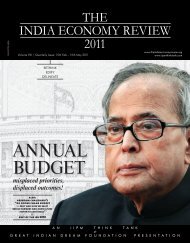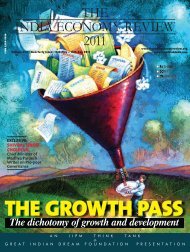Download - The India Economy Review
Download - The India Economy Review
Download - The India Economy Review
You also want an ePaper? Increase the reach of your titles
YUMPU automatically turns print PDFs into web optimized ePapers that Google loves.
T RANSFORMATIVE PLANNING<br />
Legitimatization of Planning<br />
Bodies for Development<br />
Planning body is just the division in State and Union Government<br />
as an advisory body having the authority to allocate funds but<br />
not having any authority over the departmental line in State or<br />
Union Level which diminishes its effectiveness<br />
Gouri Pada Dutta<br />
Member, State Planning Board<br />
Central Council of Health &<br />
Family Welfare, Govt. of <strong>India</strong><br />
In pre-independent <strong>India</strong>, a National<br />
Planning Committee was<br />
instituted by the then Congress<br />
President Subhas Chandra Bose<br />
which was headed by Pandit Jawaharlal<br />
Nehru. This was initiated by poet Rabindra<br />
Nath Tagore who wrote to Pandit<br />
Jawaharlal Nehru and Subhas Chandra<br />
Bose to situate such body for <strong>India</strong>’s prospective<br />
development and planning1 .<br />
Debate about the mode of governance<br />
in any country is assuming a new dimension<br />
in recent times. Ancient method of<br />
monarchial rule was radically changed<br />
after Industrial Revolution in Western<br />
Europe. <strong>The</strong>se countries needed colonies<br />
for cheap labour, raw materials for production<br />
and market for their fi nished<br />
goods. Old system of barter was replaced<br />
by fi nance capital to promote market<br />
economy. <strong>The</strong> colonies were ruled, not<br />
governed, by a steel-framed administration<br />
to serve the interest of the rulers.<br />
Twentieth century witnessed two world<br />
wars. Both were fought to grab colonies.<br />
After the First World War a socialist State<br />
was established and exhibited remarkable<br />
progress in the fi eld of economy and human<br />
development. This system promoted<br />
development, both socially and economically,<br />
by proper planning, initiated and<br />
regulated by the State.<br />
<strong>The</strong> Second World War was also for<br />
colony but its hidden objective was to<br />
destroy the socialist system. Post Second<br />
World War period was the era of liberation<br />
of colonial countries. <strong>The</strong> seeds for<br />
destructions of socialist system were sown<br />
during the terminal phase of the war,<br />
through implementation of Marshal Plan<br />
in Europe and Dulles Plan for newly liberated<br />
colonial countries. <strong>The</strong> new rulers of<br />
the liberated countries were the product<br />
of colonial system and suffered from conceptual<br />
dilemma. Patriotism in one hand<br />
and aping the systems of the past foreign<br />
rulers on the other. <strong>The</strong>se systems are<br />
intrinsically champions of capitalism<br />
through market economy. <strong>The</strong>se rulers<br />
are opposed to State’s dominance for<br />
development. <strong>The</strong> market capital got<br />
upper hand after the fall of USSR in<br />
1991 AD.<br />
<strong>India</strong>n Situation<br />
After Independence new rulers of <strong>India</strong><br />
were in a dilemma. <strong>The</strong> pro-people policy<br />
of the socialist system was suitable for<br />
them. But they could not free their mindset<br />
from the glamour of their previous<br />
rulers, specially the material benefi ts of<br />
industrial revolution and phenomenal<br />
progress of science and technology later<br />
on. <strong>India</strong>n politicians decided to adopt a<br />
mixed economy for its development which<br />
was conceptually translucent. <strong>The</strong>ir ancient<br />
heritage promoted by the illustrious<br />
sons like Rabindra Nath, Vivekananda,<br />
Shri Arabinda and Mahatma Gandhi was<br />
conceptually different from the ideas of<br />
Bengal/<strong>India</strong>n renaissance. Raja Ram<br />
Mohan Roy who himself was an enig-<br />
THE INDIA ECONOMY REVIEW<br />
81





